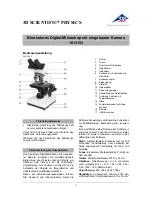
IMPORTANT
These units employ a UIS2/UIS (Universal Infinity System) optical design, and should be used only
with a microscope, eyepieces, objectives and condenser matching the UIS/UIS2 optics.
Less than optimum performance may result if inappropriate accessories are used.
1
Getting Ready
1. A compensator is a precision instrument. Handle it with care and avoid subjecting it to sudden or severe
impact.
2. Do not use the compensator where it is subjected to direct sunlight, high temperature and humidity,
dust or vibrations.
(Working environment ambient temperature and humidity should be in the range of 0-40 °C and 30-
90 %, respectively. Temperature at storage location should never be allowed to get below -10
°C).
1. To clean the lenses and other glass components, simply blow dirty away using a commercially
available blower and wipe gently using a piece of cleaning paper (or clean gauze). If a lens is stained
with fingerprints or oil smudges, wipe it gauze slightly moistened with commercially available absolute
alcohol.
!
Since the absolute alcohol is highly flammable, it must be handled carefully.
Be sure to keep it away from open flames or potential sources of electrical sparks --- for
example, electrical equipment that is being switched on or off.
Also remember to always use it only in a well-ventilated room.
2. Do not disassemble any part of the compensator.
If the equipment is used in a manner not specified by this manual, the safety of the user may be imperiled.
In addition, the equipment may also be damaged. Always use the quipment as outlined in this instruction
manual.
2
Care and Storage
3
Caution


































